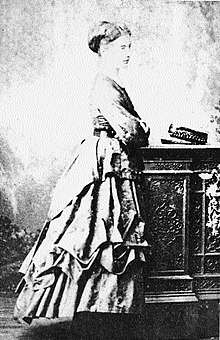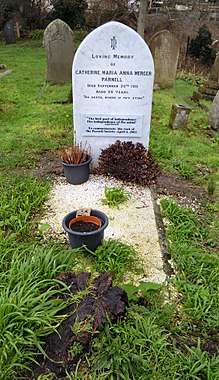Anna Catherine Parnell
Anna Catherine Parnell (13 May 1852 – 20 September 1911) was an Irish nationalist and younger sister of Irish Nationalist leader, Charles Stewart Parnell.
Anna Catherine Parnell | |
|---|---|
 Anna Parnell in Limerick (c. 1878) | |
| Born | Catherine Maria Anna Mercer Parnell 13 May 1852 |
| Died | 20 September 1911 (aged 59) Ilfracombe, Devon, England |
| Resting place | Holy Trinity Church, Ilfracombe |
| Nationality | Irish |
Early life
Anna was born Catherine Maria Anna Mercer Parnell at Avondale House in Rathdrum, County Wicklow, Ireland. The tenth of eleven children of John Henry Parnell, a landlord and Delia Tudor Stewart Parnell, an Irish-American and the daughter of Admiral Charles Stewart (1778–1869) of the US Navy. She had very little formal education as a child but the family had an extensive library which she was encouraged to read by her mother.[1] After her father died in 1859 Anna moved with the family to Dublin. Delia Parnell was an active socialite while in Dublin and exposed her children to a wide variety of political views. Anna wrote poetry and painted.[2] In 1865 the family moved to Paris but Anna felt stifled by upper class society rules imposed upon her.[3] She was in Paris when the Franco-Prussian War broke out in 1870 and was active in the American Ladies' Committee fundraising and setting up hospitals.[2]
Early political activism
Anna moved to London in 1875 to continue studying art. When her brother Charles was elected as an MP for Meath, Anna became increasingly political. She frequently visited Parliament during debates, sitting in the Ladies' Gallery. She wrote articles about the debates in a column titled Notes From the Ladies' Cage in the Celtic Monthly.[1] In 1879 Anna joined her sister, Fanny Parnell (1848–1882), a poet, in New York where they raised money in support of the Irish National Land League. The sisters worked closely with their brother Charles and Michael Davitt but were critical of how the funds raised in America were being used in Ireland.[2] In October 1880 the sisters founded the New York Ladies' Land League with their mother as president.[1]
Ladies' Land League
Anna returned in Dublin in late 1880. When it seemed that the Land League men were likely to be arrested, it was suggested that a women's league in Ireland could take over the work in their absence. Public opinion at the time was against women in politics, but the Ladies' Land League was founded on 31 January 1881 with Anna as its effective leader.[1][4]
When Charles Parnell and other leaders were imprisoned in 1881, as predicted, the Ladies' Land League took over their work. Though it was envisioned as a place holder until the men were released, Anna organised branches throughout Ireland, encouraging women to play an active role in Land League activities.[2] Offices were given to the ladies but little help. They raised funds for the League and for the support of prisoners and their families. They distributed Land League wooden huts to shelter evicted tenant families and by the beginning of 1882 they had 500 branches, thousands of women members and considerable publicity. They distributed GB£60,000 (equivalent to about £6,090,000 in 2019) in relief aid.[4]
This put the Ladies' Land League in serious debt. Anna approached Charles, requesting money to settle the debts. Charles, who distrusted Anna's understanding of politics, agreed to provide the money under the condition that the Ladies' Land League be disbanded. Anna agreed, disbanding in 1882, but she never forgave Charles.[4]
Later life

After her brother's death in 1891 Anna lived the rest of her life in the south of England under the assumed name Cerisa Palmer.[3] She wrote an angry account of her Land League experiences in Tale of a Great Sham, which was not published until 1986.[4] She made one last political appearance when she campaigned for a Sinn Féin candidate in a 1907 by-election. She drowned at Ilfracombe, Devon in 1911 at the age of 59 and is buried in Holy Trinity churchyard there.[4]
External links
- Margaret, Ward (2001). "Gendering the union: imperial feminism and the ladies' land league". Women's History Review. 10 (1): 71. doi:10.1080/09612020100200279.
- 7 BIOGRAPHIES at www.scoilnet.ie
References
- "County Wicklow Heritage". countywicklowheritage.org. Content edited by Community Sites (www.communitysites.co.uk). Retrieved 30 August 2017.CS1 maint: others (link)
- "Anna & Fanny Parnell". History Ireland. 5 February 2013. Retrieved 30 August 2017.
- "West Cork People " Political firebrand leaves lasting impression on Ballydehob". westcorkpeople.ie. Retrieved 30 August 2017.
- Boylan, Henry (1998). A dictionary of Irish biography (3. ed.). Dublin: Gill & Macmillan. ISBN 0717125076.
Further reading
- Patricia Groves, Petticoat Rebellion – The Anna Parnell Story, Mercier Press , Cork, 2009.
- A. Parnell, Tale of a Great Sham, Dublin, 1986.
- Jane Côté, Fanny and Anna Parnell: Ireland's patriot sisters, Gill and Macmillan Publishers, Dublin, 1991.
- Jane Côté & Dana Hearne, Anna Parnell in Mary Cullen & Maria Luddy (eds.)
- Women, power and consciousness, Dublin, 1995
- Danae O'Regan, Anna and Fanny Parnell in History Ireland, Spring 1999.
- Margaret Ward, Unmanageable Revolutionaries: women and Irish nationalism, Pluto Press, London, 1983